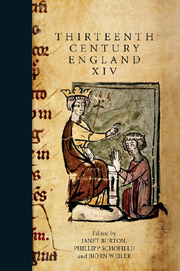Book contents
- Frontmatter
- Contents
- List of Figures and Tables
- Preface
- List of Contributors
- List of Abbreviations
- Politics and the People in Thirteenth-Century England
- Peasants, Litigation and Agency in Medieval England: the Development of Law in Manorial Courts in the late Thirteenth and Early Fourteenth Centuries
- Medieval Accounting Memoranda from Norwich Cathedral Priory
- The Seals of London's Governing Elite in the Thirteenth Century
- The Marriages of the English Earls in the Thirteenth Century: a Social Perspective
- Monks and Politics in Thirteenth-Century Wales and Catalonia
- Lope Fernández, Bishop of Morocco: His Diplomatic Role in the Planning of an Anglo-Castilian Crusade into Northern Africa
- On Kingship and Tyranny: Grosseteste's Memorandum and its Place in the Baronial Reform Movement
- St Edmund of Canterbury and Henry III in the Shadow of Thomas Becket
- Matthew Paris and the Royal Christmas: Ritualised Communication in Text and Practice
- Thomas of Lancaster in the Vita Edwardi Secundi: a Study in Disillusionment
- John and Henry III in the Anglo-Norman Prose Brut
- Genealogiae orbiculatae: Matthew Paris and the Invention of Visual Abstracts of English History
- The Genealogical Chronicles of Matthew Paris: Edition
On Kingship and Tyranny: Grosseteste's Memorandum and its Place in the Baronial Reform Movement
Published online by Cambridge University Press: 05 May 2013
- Frontmatter
- Contents
- List of Figures and Tables
- Preface
- List of Contributors
- List of Abbreviations
- Politics and the People in Thirteenth-Century England
- Peasants, Litigation and Agency in Medieval England: the Development of Law in Manorial Courts in the late Thirteenth and Early Fourteenth Centuries
- Medieval Accounting Memoranda from Norwich Cathedral Priory
- The Seals of London's Governing Elite in the Thirteenth Century
- The Marriages of the English Earls in the Thirteenth Century: a Social Perspective
- Monks and Politics in Thirteenth-Century Wales and Catalonia
- Lope Fernández, Bishop of Morocco: His Diplomatic Role in the Planning of an Anglo-Castilian Crusade into Northern Africa
- On Kingship and Tyranny: Grosseteste's Memorandum and its Place in the Baronial Reform Movement
- St Edmund of Canterbury and Henry III in the Shadow of Thomas Becket
- Matthew Paris and the Royal Christmas: Ritualised Communication in Text and Practice
- Thomas of Lancaster in the Vita Edwardi Secundi: a Study in Disillusionment
- John and Henry III in the Anglo-Norman Prose Brut
- Genealogiae orbiculatae: Matthew Paris and the Invention of Visual Abstracts of English History
- The Genealogical Chronicles of Matthew Paris: Edition
Summary
On Friday 13 May 1250, Robert Grosseteste, bishop of Lincoln, stood before Pope Innocent IV and the college of cardinals at the papal court at Lyons. Grosseteste had identified several abuses that were damaging to the Church and posed a danger to souls. His chief complaint was against the archbishop of Canterbury, Boniface of Savoy, who was attempting to levy uncustomary procurations, that is, payments from the clergy to support a visitation of the archdiocese. When it was put to Grosseteste by some of the cardinals that Boniface was entitled to the procurations by canon law, the bishop appealed to Aristotle's distinction between kingship and tyranny, as set out in Book VIII of the Nichomachean Ethics, a work which Grosseteste had been responsible for translating into Latin in its entirety for the first time for the benefit of a western audience. The bishop had also written a commentary for Book VIII, and it is from this commentary, as well as Aristotle's own words, that Grosseteste drew to make his case against Boniface, arguing that the archbishop, rather than burdening his subjects financially, should use his own extensive wealth to conduct the visitation.
On his return to England Grosseteste had Richard Gravesend, the archdeacon of Oxford who had accompanied him to Lyons, write up his whole case as a memorandum to be sent back to the cardinals. Grosseteste also, however, sent an ‘abbreviatio’ – the section of the memorandum dealing with kingship and tyranny – to his friend and disciple, Simon de Montfort, earl of Leicester.
- Type
- Chapter
- Information
- Thirteenth Century England XIVProceedings of the Aberystwyth and Lampeter Conference, 2011, pp. 115 - 128Publisher: Boydell & BrewerPrint publication year: 2013



